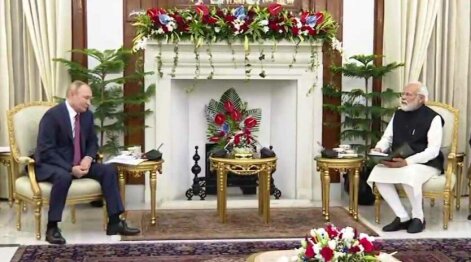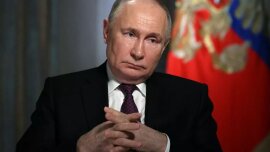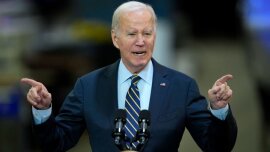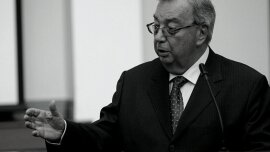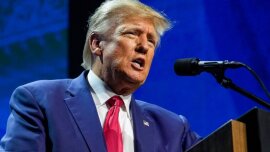Finally, we were able to return to the usual long reads and deep analytical materials from the life of the international community. Taking into account the war in Ukraine, the demand for analytics regarding the positions of external players has increased. As the war drags on and moves into a long-term course, it is necessary to gradually return to a broad framework for perceiving our situation and analyzing global politics.
In this case, we decided that it would be useful to look not at the “ Western world ” we are used to, but at other countries that are not part of it, the rest of the world, which equally determines the development of international relations - the countries of the Asia-Pacific region . Since the region includes a large number of countries, we decided to divide the material into two parts for the convenience of readers.
Japan: sleeping dragon spreading its wings
Japan expressed categorical support for Ukraine and condemned Russia's military aggression, calling it a violation of international law, which undermines the foundations of the international order not only in Europe but also in Asia. It was Japan that stood out sharply against the background of other non-Western countries as the informal leader of the Asian anti-Russian front.
Tokyo acted as a united front with the G7 countries, already on February 23 announcing its intention to impose a ban on issuing visas to representatives of the DLNR, freeze their assets, ban trading operations with both "republics", and also impose a ban on transactions with Russian government securities. On February 25, new measures were announced: a temporary cessation of issuing visas to Russian citizens, freezing the assets of the Bank of Russia, VEB.RF, Promsvyazbank, as well as export sanctions to Russian structures associated with military activities and for the export of controlled goods included in the internationally agreed list and other dual-use goods, such as semiconductors, as well as general-purpose goods that contribute to strengthening the military potential of the Russian Federation. Japan has imposed a ban on the export of oil refining equipment and technologies, and is also considering the possibility of closing airspace for Russian airlines and plans to deprive Moscow of the most favored nation treatment in trade.
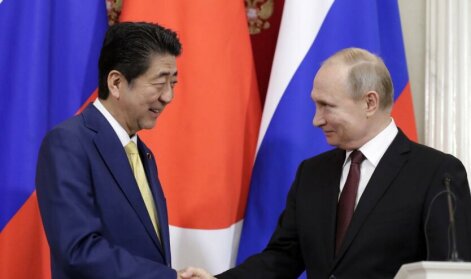
On February 27, Japan, the last of the G7, announced its intention to disconnect Russia from the SWIFT payment system, and later a list of 49 companies and organizations subject to sanctions was published, in particular, the Russian Ministry of Defense, the Russian Foreign Intelligence Service, the Russian Federal Security Service, Rosoboronexport, Rostec, PMC Wagner, etc., as well as lists of officials (subsequently, the lists of individuals, banks and organizations were expanded and also included Belarusian companies and personal sanctions against Belarusian officials and oligarchs), including V. Putin, D. Medvedev, ministers S. Lavrov, S. Shoigu, V. Matviyenko, V. Volodin, N. Patrushev, V. Gerasimov, D. Peskov, deputy heads of the presidential administration D. Kozak and S. Kiriyenko, head of the Chechen Republic R. Kadyrov, Russian businessmen A. Usmanov, G. Timchenko, the Rottenberg brothers (a total of about 50 people), against whom personal sanctions (primarily asset freezes) were implemented.
Among Japanese companies, which announced a partial or complete cessation of their activities in the Russian market and representatives of the automotive industry, such as Mazda Motor Corporation, Nissan, which is preparing to stop the car plant in St. Petersburg and has suspended the export of cars to Russia, Honda, Toyota, which has stopped car production, including Lexus, to the Russian Federation and the export of cars and components to the country due to "supply problems", however, there is no talk of exiting the Russian market, Suzuki, Mitsubishi, as well as the Japanese tire manufacturer Bridgestone, have also joined these companies, and the Japanese tire manufacturer Bridgestone decided to close its plant in Ulyanovsk and stop exporting products to the Russian Federation. In addition, Japanese banks Mizuho, Mitsubishi UFK, Sumitomo Mitsui, as well as the largest Japanese payment system JCB, one of the seven leading payment systems in the world, will suspend their activities in Russia.
Japan's reaction to the Ukrainian crisis is remarkable not only for sanctions and verbal support. Prime Minister Fumio Kishida has already pledged $200 million in humanitarian aid to Ukraine, as well as $100 million in soft loans. A significant moment was the supply of equipment for the Ukrainian army. Last month, the first batch of bulletproof vests and helmets was sent. This is a rare case of Japan supplying defense products to a country participating in the conflict.
It can be erroneously assumed that, having come out in defense of Ukraine, Japan is in solidarity with the West because it does not change its foreign policy tradition and follows in the wake of its senior partner, the United States. However, in reality, a tough anti-Russian stance should, firstly , confirm Japan's reputation as a champion of liberal values such as democracy, human rights and a market economy. And secondly, to demonstrate that Japan is ready to actively act in the international arena on its own, choosing which side of the conflict to join.
The loss of the Russian market in the short term will most likely have a negative impact on the Japanese economy, but they will not become critical for Tokyo. Most importantly, the aggravation of relations with Russia will become a significant incentive for the final revision of its place and geopolitical significance both in the region and in the world, as well as the defense system, including the issues of reformatting the Self-Defense Forces.
Japan will more confidently follow the path of regaining the status of a “normal” state with a full-fledged army. Kishida has already made several important statements, in particular, about the need to significantly strengthen the country's defense capability. Tokyo has previously used North Korea's nuclear missile program as a rationale for increasing and strengthening its defense potential, as well as China's active activities in the East and South China Seas.
Now Russia is added to the list of countries that pose a threat to Japan's national security to some extent, given that a clear anti-Russian position finally levels the already vague prospect of concluding a peace agreement between the two countries following the results of World War II, through which the former Prime Minister of Japan Shinzo Abe planned to resolve the issue of the status and ownership of the Kuril Islands.
Kishida, at a meeting of the budget committee of the House of Councilors, the upper house of the Japanese parliament, said that Abe's conciliatory policy towards the Russian president did not produce results for Japan. Later, during the parliamentary debate, speaking about the status of the Kuril Islands, Japanese Foreign Minister Yoshimasa Hayashi called their southern part (Kunashir, Iturup, Hamobai and Shikotan) primordially Japanese territories, while the director of the department (bureau) for European affairs, Hideki Uyama, directly said that the South Kuriles are occupied by Russia.
By the way, on March 21, the Russian Foreign Ministry issued a statement stating that it was refusing to negotiate on the Kuril Islands and conclude a peace agreement, while Moscow laid all the blame for the rapid deterioration of bilateral relations on Tokyo. Thus, the war of the Russian Federation against Ukraine has carried into history one of the products of the era of "détente" and 30 years after the "cold war" - the format of peace negotiations on the Kuriles, and also forces Japan's departure from the post-war status that they were given by the United States and the victorious countries in Second World War.
In addition to Russia, the Japanese government is seriously concerned about the growing activity of China in the East China Sea, the expansion of its zone of interests in the South China Sea , which encourages Japan to remain consistent and maintain the existing asymmetric alliance with the United States, but at the same time increase its defense capabilities, and also look for like-minded people among countries in the ITR.
This is evidenced by Kishida's recent visit to India, during which he met with Indian Prime Minister Narendra Modi. On the agenda, in addition to the war in Ukraine and its consequences for the world community, were also the situation in Myanmar, the development of cooperation within the framework of QUAD, but most importantly, China's activities in the nearby seas, as well as the results of recent talks between Chinese Foreign Minister Wang Yi and his Indian counterpart Subramanyam Jaishankar on the border conflict in the eastern part of the Ladakh region.
Lately, China-related concerns have been more focused on Taiwan. Japan is closely following the development of the situation around the island and in its White Paper 2021 stated that Japan's national security is inextricably linked to stability in the Taiwan Strait and in the event of China's armed aggression against Taiwan, Tokyo intends to be directly involved in resolving the crisis with its allies.
For Japan, the current crisis is not so much about Ukraine and Europe, but about China and the ITR. By demonstrating a tougher stance on Russia, Tokyo is signaling to China that attempts to expand its influence in the region by force will not go unanswered. This shows a clear willingness of Japan to establish itself as a world state capable of responding to existing crises. This is also confirmed by Kishida's proposal during the congress of the ruling Liberal Democratic Party to join the process of reforming the UN Security Council, bearing in mind, in addition to limiting the right of veto, that Japan should take the place of one of the permanent members of the Security Council.
Consequently, the Russo-Ukrainian war unequivocally affects the deterioration of Russo-Japanese relations , which makes Russia a potential threat to Japanese national security. This, in turn, will contribute to Japan's more confident development of its defense potential. Moreover, this will push Tokyo to search for like-minded people in the ITR and the world, as well as strengthen cooperation with them, and will definitely contribute to Japan's more active work to strengthen its international status.
South Korea: second outpost in Pyongyang's shadow
Less belligerent, but just as active, was South Korea , which also expressed unconditional support for Ukraine in the war with Russia and voted for a resolution at the UN.
South Korea joined the sanctions imposed by Western countries and Japan, including: a ban on the export of strategic materials, disconnection of sanctions banks from SWIFT, termination of transactions with the Central Bank, a ban on exports to 49 Russian companies from the list.
At the same time, South Korea has been freed from extended US export restrictions on Russia and will introduce its own. However, Seoul's export restrictions will have to comply with those of other Western countries, in particular, restrictions on 57 items in such areas as semiconductors, computers, information technology, sensor and laser technology, aviation and aerospace. It should be said that the production of semiconductors, a key South Korean export commodity, depends on the supply of Russian and Ukrainian resources (inert gases and rare earth metals), although otherwise South Korea's economic interests in Russia are insignificant.
Among the companies that stopped working on the territory of the Russian Federation was Hyundai, which suspended production at a plant in St. Petersburg and the supply of finished products and components to the Russian Federation, as well as Samsung, which suspended the supply of phones and chips. Although formally companies have the right to continue their work in Russia, which, however, is complicated by the termination of the usual supply chains.
At the same time, South Korea plans to provide Ukraine with non-lethal military aid worth 1 billion won (over $804,000). The logistical support package consists of approximately 20 items, including bulletproof helmets, tents, ready-to-eat meals, blankets and first aid kits.
South Korea is a traditional ally of the United States , so the reaction from the Korean authorities is quite expected, given that in 2014 South Korea also did not recognize the annexation of Crimea, and Korean business complied with the sanctions imposed by the United States and its allies, although Seoul did not impose its own.
Before the start of the Russian-Ukrainian war, relations between South Korea and Russia were even, given, firstly, the absence of a zone of conflict of interest: Russia concentrated on the post-Soviet space, tried to maintain relations with the West in a more or less adequate state, developed cooperation with China and India . The focus of Korea's political attention was focused on the East Asian region, while Russia occupied a marginal position. In addition, there are no ideological and historical irritants or territorial disputes between Moscow and Seoul, as, for example, in relations with Japan.
Russia was interested in South Korea, first of all, in two aspects: trade and tourism . From the point of view of tourism, Korea was attractive due to the visa-free regime for Russian citizens. As for trade, until recently, Russia ranked 12th in South Korea's foreign trade turnover. For Russia, the role of South Korea is somewhat higher: the country ranked sixth in imports and eighth in exports. The two main items of Russian exports to Korea are fuel and fish, imports are cars and equipment for nuclear reactors. Seoul had a diplomatic interest in Moscow: the hope that the Kremlin would be able to convince Pyongyang to embark on the path of nuclear disarmament. Although the prospect is very illusory, given the very limited influence of Russia on the DPRK, but it was still present.
It can be assumed that the relatively soft position of South Korea, in comparison with Japan, in relation to Russia may become tougher in the near future. This will be connected with the coming to power of a new president, whose elections were held on March 9. Yoon Seok Yeol from the main opposition party Power of the People won the election and is scheduled to be inaugurated on May 10.
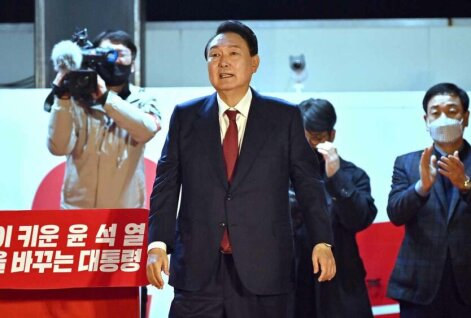
Conservatives traditionally advocate strengthening the military alliance with the United States with total containment of the DPRK. At the same time, Yoon Seok Yeol believes that relations with Tokyo, which are at an extremely low level due to heated disputes over issues related to the colonial past and territorial disputes, need to be normalized. In recent years, the focus of anti-Japanese sentiment in South Korean society has shifted to anti-Chinese, so it is likely that the public will support the new president's course towards rapprochement with Japan.
During the election race, Yun Sok Yeol openly supported Ukraine and stated that the cause of the conflict was the inability of the Ukrainian leadership to find a true ally, indicating that Washington is such for Seoul and in the future the South Korean-American alliance will be strengthened.
Therefore, it can be assumed that Russian-South Korean relations will worsen, given the fact that Russia has included Korea in the list of unfriendly countries. At the same time, the new president will have to develop a balanced strategy for relations with China. This is likely to be the focus of the new administration's efforts. Although Russia was a minor participant in the settlement of the "Korean issue", one way or another, it played its role in this process. Now, South Korea should show solidarity with China and work together to resolve the North Korean nuclear issue.
Taiwan: A fragment of the West in the stormy sea of the East
Taiwan, recognizing itself as a member of the world democratic alliance, also condemned the decision of the Russian president to start a full-scale war against Ukraine and joined the imposition of anti-Russian sanctions. In particular, Taiwan supported the disconnection of sanctioned Russian banks from SWIFT, and the world's largest Taiwanese semiconductor manufacturer TSMC suspended the supply of its products to the Russian Federation.
Taiwan, speaking out against Russian aggression against Ukraine, firstly, proceeds from the fact that the Russian Federation does not maintain official interstate relations with Taiwan and recognizes that the PRC government is the only legitimate government that represents the Chinese people, and Taiwan is an integral part of China. Secondly, Taipei follows the foreign policy of its main ally - the United States , and thirdly, does not miss the opportunity to remind the PRC that Taiwan is an independent state that pursues its own foreign policy, often radically different from Beijing's.
It should be noted that in 1992, an unofficial coordinating commission for economic and cultural cooperation was created in the Russian Federation by presidential decree, the Taiwanese and Russian representations of which were opened respectively in 1993 in Moscow, and in 1996 in Taipei. Representative offices served as an unofficial channel of communication, promoted cultural exchange, development of economic and trade relations. Since 1991, the Taipei World Trade Center and a representative office of the China Foreign Trade Development Council (TAITRA) have been operating in Moscow.
Over the past year, bilateral trade between Taiwan and the Russian Federation amounted to $5.3 billion , while exports were $3.226 billion, and imports were $2 billion. Russia has constantly maintained a positive balance in trade and economic relations with Taiwan due to crude oil, iron and steel, non-ferrous metals , petrochemical products, ferroalloys, wood, chemical fertilizers. Among the imported goods, the main place was occupied by electrical products and parts, computers and computer components, consumer electronics. Russia occupies a very small share in Taiwan's foreign trade, while Japan, China and the United States remain Taipei's main partners.
In fact, Russia has never been of strategic importance to Taiwan, whose foreign policy focuses more on diplomatic confrontation with the PRC. Moreover, in recent years, Taipei has obviously been losing this battle, because every year some country, breaking off diplomatic relations with the Republic of China, goes over to the side of Beijing.
With this in mind, Taiwan is logically shifting its focus from, say, Oceania or Latin America to European countries. Sufficiently significant progress has recently been observed in bilateral political cooperation with Lithuania. By the way, the Taiwanese government plans to send a delegation to visit the Czech Republic, Slovakia and Lithuania at the end of March. Consolidation with the West, which is clearly on opposite sides of China in the Russian-Ukrainian war, could potentially contribute to further intensification of diplomatic and economic relations with other EU countries, where Beijing has not yet had time to assert its positions (as is happening, for example, in Hungary or Greece).
For Taiwan, the war in Ukraine was a great moment to intensify lobbying in the United States for more military-political assistance. To do this, analogies are being actively drawn between the Russian invasion of Ukraine and the probable Chinese invasion of Taiwan. Moreover, in recent years in Washington they themselves have developed this topic, warning that Beijing may soon resolve the "Taiwan issue" by force.
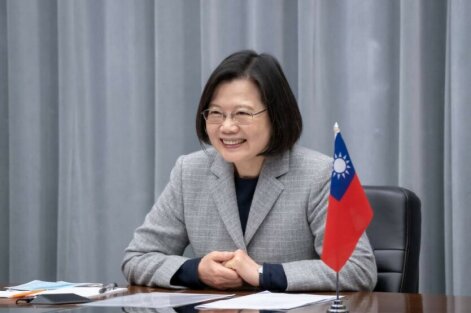
Already on March 1, a high-ranking delegation from the United States arrived in Taiwan, which included former top officials from the security forces of the Bush and Obama eras: former head of the Joint Chiefs of Staff Michael Mullen, former Undersecretary of State for Defense Michelle Flournoy, and former presidential adviser on national security Megan O'Sullivan , former NSC Asia Senior Directors Michael Green and Evan Medeiros. Later, former US Secretary of State under Trump, Michael Pompeo, also arrived.
Everyone adhered to the same line: they called on the Biden administration to actually retreat from the "one China policy" , increase military-technical assistance to Taiwan, strengthen the military presence in the Taiwan Strait area, and impose sanctions against China. Former US Ambassador to the UN Michelle Syson even called for Taiwan to join the UN, and Pompeo called on Biden to recognize Taiwan as an independent state.
To enhance the effect of the visits, on March 2, Taiwan Vice President William Lai expressed a desire to join the pro-American alliance QUAD, which the United States was afraid to do due to the possibility of an escalation of relations with Beijing and because of the violation of the "one China policy". This lobbying paid off, and on March 13, the Biden administration banned Taiwan from being shown on the political map of the world as part of the PRC, which was another departure from the "one China policy", causing a sharp reaction in Beijing.
In short, against the backdrop of the war in Ukraine, Taiwan launched an active operation, trying to become the "pearl" of the anti-Russian (and therefore anti-Chinese) pro-American alliance in the region in the hope of attracting financial and military assistance and further dismantling the "one-China policy" under the security umbrella of Washington.
India: an elephant waiting to fight a dragon
Among those countries that officially adhere to neutrality and are in favor of a peaceful settlement of the conflict, was India.
On the one hand, India does not openly support Russian aggression , calling for an immediate cessation of hostilities and resolution of the conflict through diplomatic means. On the other hand, she avoids open criticism of the Russian Federation , and also abstained from voting for the UN General Assembly resolution on March 2, while offering rather loose arguments explaining her position.
On February 24, Indian Prime Minister Narendra Modi made the first call to the Kremlin. I spoke with President V. Zelensky only 2 days later. In conversations with both presidents, Modi consistently called for an immediate ceasefire and a return to diplomatic tools to resolve the conflict. The ambiguous reaction of the Indian government caused a misunderstanding on the part of partners, primarily in QUAD. Japan put forward a claim to India in this regard and demanded that India formulate a clearer response to Russia's aggression against Ukraine.
India is by default regarded as an ally of the United States. At the same time, for Indian foreign policy, especially during Modi's premiership, a characteristic feature is the desire to maintain a certain strategic autonomy, avoiding an asymmetric alliance with America , as can be observed in the case of Japan and South Korea.
This strategic autonomy is manifested in the fact that India develops relations with various world centers of power, and often in multilateral formats: in QUAD, India interacts with the United States and Japan (which are also united by the Indo-Pacific concept) in BRICS with China and Russia.
Russian-Indian relations have some functional similarities with Russian-Vietnamese ones. First, decades of friendly relations dating back to the days of the Soviet Union. Secondly, the role of Russia as a geopolitical instrument for maintaining a balance in relations with the PRC. Thirdly, military-technical cooperation and Russian arms exports as the key and most successful aspect of bilateral cooperation.
During his visit to New Delhi in December last year, Vladimir Putin agreed to develop Russian-Indian relations in a number of areas, in particular, in the economy, energy, military and security. On the same day, an agreement was signed between the governments of the two countries on a military-technical cooperation program from 2021 to 2030, which provides for the supply and development of weapons and military equipment.
Russia is the largest supplier of weapons to India, 70% of the equipment in service with the Indian army is Russian-made. India is already developing BrahMos hypersonic cruise missiles with Russia and has acquired the critical S-400 air defense system from Moscow as a strategic deterrent against Pakistan and China.
At the same time, in December, the Indian authorities announced their interest in oil supplies from the Russian Federation under long-term contracts and preferential prices and an increase in imports of liquefied natural gas via the Northern Sea Route . In addition, both sides intend to continue cooperation in the gas sector, in particular, to invest in gas infrastructure and distribution system. The Russian state enterprise Atomstroyexport is building India's largest nuclear power plant, Kudankulam.
India, the third largest oil importer after China and the US, is also counting on Russian oil and gas to maintain its energy security. Thanks to recently signed energy agreements, firstly, the annual volume of bilateral trade is expected to triple from the current $11 billion by 2025, and secondly, India has ensured uninterrupted supplies of Russian coal. In addition, India last year signed a contract with Rosneft for 2 million tons of oil, and will also invest in Russian oil fields and LNG projects and coking coal production in the Russian Far East.
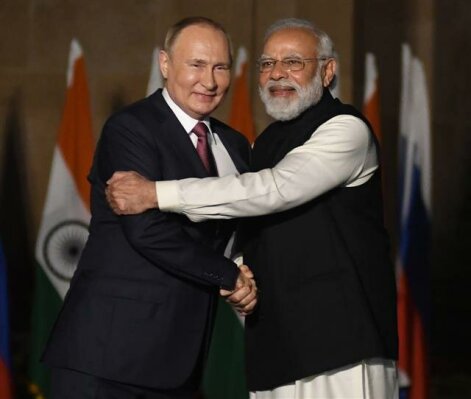
However, economic, military-technical aspects are certainly not the only reasons why India continues to maintain close cooperation with Russia. It is very important for India to keep Russia in the focus of its political attention and ensure that Russia does not create new threats to national security. The primary threats to India's security come precisely from the western flank: Pakistan, Afghanistan. With the withdrawal of American troops from Afghanistan and the corresponding decrease in the presence and influence of the United States in the region, Delhi's security concerns have increased.
India can't help but worry about Russia conducting Friendship 2021 joint exercises with Pakistan in the Krasnodar Territory at the Molkino training ground, or hosting a Taliban delegation in Moscow, or continuing to strengthen relations with China.
The Russo-Ukrainian war sets a potentially dangerous precedent for India. The occupation of the territories of an independent state, followed by the declaration of their independence, as Moscow did with the DLNR, can become a negative example for neighboring countries that have territorial disputes with India - for Pakistan, primarily supported by China, which also has a number of territorial claims to India.
India is facing an increasing role of China on the world stage, which is completely contrary to its national interests as a rival country for regional influence. Although, by and large, a more confident reaction to the emerging geopolitical crises, which has become the Russian-Ukrainian war, is expected from a country claiming regional leadership.
At the same time, a neutral position indicates that Delhi will maintain a dialogue with Moscow, trying to maintain its strategic foreign policy autonomy, which, however, is not perfect.
North Korea: a pariah at the forefront of the anti-Western struggle
North Korea fully supported Russia and its aggression against Ukraine, saying that the Russian Federation had well-founded and just reasons for the war, including, in particular, the " hegemonic policy " and " arbitrariness " of the West. In its first official statement on the Russian " special operation ", the DPRK Foreign Ministry said that the West is guilty of its " abuse of power ", and the United States is the root cause of the " Ukraine crisis ". By blaming the US and the West for the political and economic destruction of Iraq, Afghanistan and Libya, North Korea identifies the arbitrariness of the US and its allies as the main factor in destabilizing the world order.
In principle, it is not necessary to explain the logic of this position for a long time. Anti-Americanism and anti-Western sentiments have been one of the pillars of the ideological and political position of the DPRK since the middle of the 20th century . Russia is one of the few countries in the world that still maintains trade and economic relations with Pyongyang and has supported their position against the United States over the years. Therefore, the rhetoric of the DPRK in the context of the war in Ukraine is mainly focused on the “external dimension” of the Russian war in Ukraine, that is, it is considered as an element of the Russian war against the United States, and therefore, from the point of view of the North Koreans, against a common enemy.
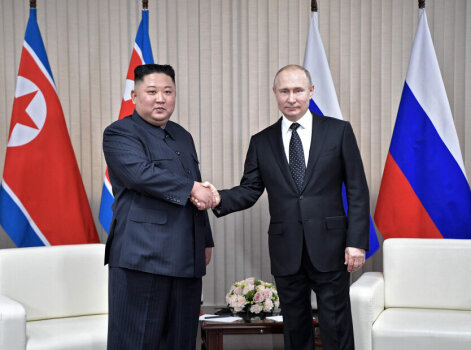
North Korea is quite naturally interested in developing contacts with other countries that do not treat it hostilely and do not put forward demands that, in the opinion of the North Korean elite, threaten the national interests of the DPRK. Russia is the only one of the neighboring countries and the only one of the world states to which Pyongyang has no significant claims , but, on the contrary, expresses its full commitment. Unlike Beijing, Moscow is not trying to turn the DPRK into its sphere of influence and to some extent control its foreign policy or domestic reforms. At the same time, unlike the United States, South Korea, and Japan, Russia is not interested in overthrowing the North Korean regime, but, on the contrary, in preserving it.
At the same time, Russia has its own interest in the DPRK, which manifests itself to a greater extent in the military-diplomatic aspect.. The economy plays a secondary role, despite the interest of both parties in mutual trade. It is impossible to increase economic cooperation, since the Russian market and Korean socialist economies are different from each other, and Russia has never intended to subsidize the DPRK economy due to the lack of obvious benefits. This would require large investments at the lowest possible return. And this is due to the fact that Russia lacks the levers of pressure on the DPRK, unlike China, which could lead to huge losses in the event of another aggravation on the peninsula. In addition, active intervention in the DPRK could provoke a conflict of interest with China, which is actually the main sponsor of the North Korean regime.
Concerning the military-diplomatic aspect, it mainly concerns the security problem associated with the nuclear program of the DPRK. Russia is directly interested, firstly, in maintaining the status quo on the Korean Peninsula, and secondly, in avoiding any even conventional armed conflict, not to mention the use of tactical nuclear weapons, and has two main motives for this.
First of all, the Russian region adjacent to the peninsula - Primorsky Krai - is not only the economic and administrative center of the Far Eastern Federal District (FEFD), but also the place where the transport and logistics infrastructure is concentrated, connecting Russia with Asian countries (seaports, to which two strategic railway lines - Trans-Siberian and BAM). Thus, a conflict that could potentially lead to the destruction of the regional economy, a migration crisis and an environmental catastrophe could threaten the entire Russian economic strategy in Asia.
Secondly, an armed confrontation between the DPRK and the Republic of Korea, for example, will inevitably lead to an increase in the US presence on the peninsula and in the Indo-Pacific region as a whole, in which Russia is absolutely not interested, since this will mean the further development of the American strategic missile defense system. defense in Asia, as well as the possible strengthening of military alliances with Japan and South Korea in the immediate vicinity of the Russian borders.
North Korea was one of 11 countries that supported the annexation of Crimea by Russia in 2014, after which, in connection with the imposed Western sanctions, Moscow began a foreign policy turn to the East, increasing interaction with Asian countries. In this regard, there was a surge of Russian diplomatic activity in relation to the DPRK. In the new geopolitical conditions, when Russia found itself isolated as a rogue state, one should expect a more active policy towards the DPRK, which will be carried out in close coordination with China. Some representatives of the Russian Federation are already proposing to “strengthen the integration of the Russian Federation with the DPRK,” but so far it all looks like public bravado, and no real plans or will to do so.
So, it becomes more or less clear where among the Asian countries we can find allies, and with whom the dialogue can be strained. It turns out that the traditional allies of the United States - Japan and South Korea, as well as Taiwan, which is more likely not an ally, but a junior partner - expressed support for Ukraine in the war, imposing sanctions against the Russian Federation and providing various types of assistance to our country.
There are those who, on the contrary, approved of Russia's actions, among them, predictably, was North Korea. The situation is much more complicated in India, which seeks to balance in the current situation and looks back at China.
However, we must not forget that all countries act primarily on the basis of their national interests and pursuing their (geo)political goals, and not at all because they sincerely support one or another side of the conflict.
